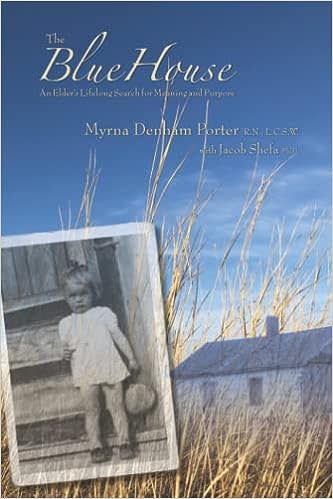Indian Wells author’s inspiring memoir shines a light on giving back
Courage, fate, philanthropy, empowerment, forgiveness and moving through cancer are but a few of the relatable topics that fill Myrna Denham Porter’s compelling new book, “The Blue House: An Elder's Search for a Life of Meaning and Purpose.” It’s a timely memoir, arriving in an era when polarizing politics and watered-down newsbytes vie for attention in a packed social media universe.
How lovely it is, then, to be reminded that it can be great to be human and act humanely. There’s nothing like it, in fact, and certainly the alternative isn’t pretty.
Denham Porter, who is in her early 80s, certainly knows what she’s talking about. She’s long been a licensed clinical social worker and registered nurse. Before settling in Indian Wells, she became the co-founder of a nonprofit cancer support center in the northwest suburban Chicago area, and locally, she has been actively involved with the Palm Desert Middle School KARE (kindness, attention, respect, and excellence) Program.

There’s more in between, of course, which Denham Porter covers in her book, a lovely tome that leans heavily into finding purpose in one’s life.
“People ask me if writing the book was a ‘cleansing’ experience and in a sense, maybe it was,” she says. “But I really wanted my grandchildren to be aware of my experience as a child and my focus on the need to be persistent. That if you want to accomplish something, then work hard and contribute back to society.”
One of the things that truly stands out in Denham Porter’s memoir, is how well she captures each segment of her life and the lessons learned along the way. She begins by recounting what it was like to be part of a family of 16 children who lived in an extremely isolated area of Saskatchewan, Canada, deep in the Canadian prairie.
“They say that character is destiny,” she writes in her very first chapter, titled “Atop a Throne of Cordwood.” “Clearly, my character at that young age was still forming. Perhaps I knew what I didn’t want to become more clearly than what I did want.”
She was the sixth oldest of the children in her family, noting that, “We’ve all succeeded and have done extremely well.”
She credits her mother, who was, “caring and loving and wanted the best for us ... I was just 6 years old when I was a ‘mother’ to a lot of my brothers and sisters, as you might expect in a family of that size.”
Her teen years brough major life transitions, and she went to live with her aunt and uncle in Chicago in 1957, prior to entering her senior year at Franklin Park High School.
“Their hunger to change my life stood out,” she recalls. “I had a loving and sophisticated aunt, and when I moved in, not only was I like a daughter to her, but like a daughter to her husband who was not a blood relative. He probably was the first real loving parental figure I had. When I got married, some seven years later, he gave me a way.”
Looking back at that time, she feels, “it was quite courageous, and maybe adventuresome, for a teenager to just be delighted to think that she could move to the United States and succeed. And that did happen.”
As “The Blue House” progresses, each of the vignettes featured take us deeper in Denham Porter’s experiences. In her 20s, life as a United Airlines stewardess was rewarding, as was her marriage to financial titan Stu Porter. The couple had two sons, imparting wisdom to them along the way.
Then came a twist of fate. Just beyond middle age, the couple were both diagnosed with cancer, something they intentionally tried to draw meaning from.
“We lived out in a small town atmosphere at the time,” she recalls, “and I had very close friends around, but I remember thinking, ‘if only I could be somewhere where I could interact with people who have gone through the same experiences. And I remember clearly thinking that that's the part that was missing.”
To that end, the couple took a leap and created several nonprofit organizations to help cancer survivors and their families. The organizations were in existence for 15 years, and at one point, served 60 communities in the area.
The death of her husband brought on several epiphanies that revolved around endurance and persistence. So, too, did a first-time visit to the graves of her parents, where suddenly major life lessons became clear: perhaps it was all about forgiveness and compassion.
Excited about the book’s release, Denham Porter says she hopes readers take away a sense of understanding the, “need to find purpose and the sensitivity and need to support others.”
And deeper inquiries into the self.
She also hopes the book piques interest in how faith can play a vital role in life — her late-life visit to The Holy Land of Israel stands out in the book, in fact — and several ideal ways to fundraise and increase awareness around community-impact programs.
“I enjoy being connected to a sense of purpose beyond my own self-fulfillment,” she muses.
“The Blue House: An Elder's Search for a Life of Meaning and Purpose” is available on Amazon.
Greg Archer writes about change agents, happenstance and the entertainment industry. His work has appeared in the USA Today Network, Palm Springs Life, Huffington Post, The Advocate and other media outlets. His memoir, "Grace Revealed," chronicles his Polish family's odyssey during World War II. gregarcher.com.
This article originally appeared on Palm Springs Desert Sun: Indian Wells author’s inspiring memoir shines a light on giving back
